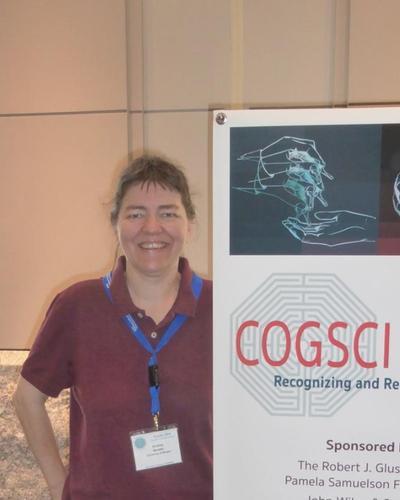The Cultural Roots Of Human Cognition
The hominin line shares most of its genetic makeup and a great deal of its behavioral repertoire with its closest primate relatives. At some point in the past, however, it set off on a different evolutionary trajectory, culminating in cognitive skills that are impressive both in extent and in the speed at which they have evolved. One goal of SapienCE is to shed light on when this process began and what may have triggered it.

Hovedinnhold
Researchers increasingly agree that the human capacity for culture played a key role in the evolution of our cognitive skills. This capacity is tightly linked to a predisposition for collaborating with the members of one’s social group. As demonstrated by Tomasello and colleagues, it rests on a range of characteristics that are especially pronounced in humans: a keen interest in what others think and believe, a willingness to share one’s thoughts and beliefs, from simple communication to explicit teaching, and the faculty for language, which provides the tool for doing this efficiently. Jointly, these characteristics lay the ground for the accumulation of knowledge in unprecedented ways.
The role of culture and evolution for human cognition
Cumulative culture as defined by Tomasello is one of the main driving forces in the evolution of human cognition: by ratcheting up cultural innovations, promoting new cognitive skills, rewiring brain networks, and even shifting gene distributions. In SapienCE, we take this idea one step further. Humans gain access to an ever-increasing body of knowledge and beliefs because they are willing and able to learn from other members of their social group. What they know and believe also affects what they perceive, how they remember, and which inferences they draw. In other words, it shapes their cognition.
As detailed in a recent paper, this impact of cumulative culture on cognition has two implications. The first is that evolutionary processes have not stopped but are still active in shaping cognitive behavior. For instance, an interest in quantities led people to invent cognitive tools for counting, which then enabled simple calculations; once addition was in place, multiplication came into reach, which paved the way for exponentiation and functional calculus. Today, global dotcoms develop powerful algorithms to measure, predict, and manipulate the preferences and choices of their users. The other implication of cumulative culture is that it promotes diversification, including in cognition. Returning to the above example, counting systems therefore differ substantially across languages and cultures.
While such an evolutionary perspective improves our understanding of present-day cognition, it can also be harnessed to investigate past cognition. The central idea here is that retracing the diversification process allows us to reconstruct ancestral states. Charting diversity also helps us to identify shared features, both now and then: The more widely shared a feature is today, the more likely it was also present in, or at least available to, our ancestors.
The cultural fabric of human causal cognition
In a second paper published in 2019 , this strategy for investigating past cognition was applied to causal cognition, that is, the processing of information on cause–effect relations, from perception to problem-solving.
Causal cognition is relevant for understanding why (and ideally: how) an event happened, for predicting which outcome it will lead to, and for designing interventions that successfully change its course. This makes it indispensable for developing and refining tools, for grasping the role of weather conditions and environmental features for subsistence and navigation, or for improving measures to prevent and treat illnesses. Asking why-questions, and seeking to answer them, lies at the heart of science, technology, and religion. For these reasons, some scholars even consider a concern with causality as the main driving force in human evolution.
The review of available literature yielded two key insights: Causal cognition involves a number of components that are phylogenetically old and widely shared across species; in humans, however, it is also profoundly shaped by culture. Being able to harness one’s understanding of cause–effect relations for changing one’s niche is in fact so advantageous that the foundations of this cognitive ability evolved independently in species such as primates and corvids. In contrast to their non-human relatives, however, humans do not just ponder about causal mechanisms behind the patterns they observe, but also absorb enormous amounts of causally relevant knowledge. This is partly organized in cultural models and theories, which in turn affects how humans perceive and reason about cause-effect relations.
Based on this analysis, it is safe to assume that early modern humans possessed the same cognitive toolkit for dealing with causality that present-day humans have in common with their closest relatives. In addition, we can, with some degree of certainty, ascribe to our ancestors a willingness to share causal information, to actively teach and learn from teaching, and even the ability to infer valuable information from one’s assumptions about other people’s knowledge. Beyond this shared core, causal cognition would be moulded by culture. For drawing any further inferences, additional data are therefore needed, deriving, for instance, from the artefacts that our ancestors produced and used, or from insights on how they interacted with their environment.
The extent to which causal cognition would have been shaped by the cultural transmission of knowledge and beliefs also, and in fact crucially, depends on whether these people already had a full-fledged language at their disposal. Astonishingly enough, this is another key question that has remained open – and one that we in SapienCE plan to address in future work.
